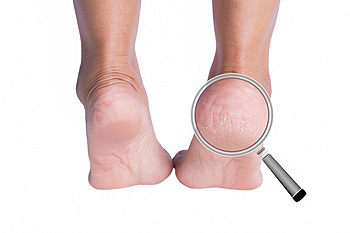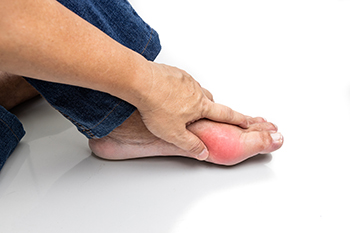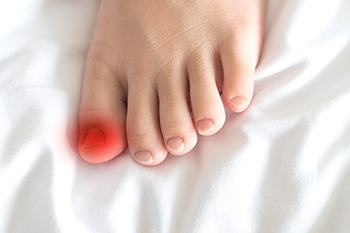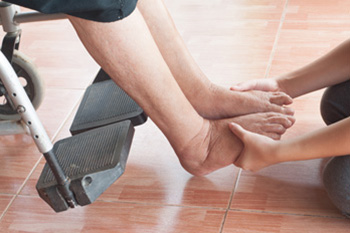Items filtered by date: November 2022
Pros and Cons of Achilles Tendon Stretches

When athletes, and especially runners, stretch tight calf muscles, they may be doing more harm than good to the Achilles tendon, experts say. Short active stretches may be more beneficial than passive stretching, where the heel is pressed downward and held for an extended period of time. Research has shown an overload on the Achilles tendon can cause it to become inflamed. When a typical calf/Achilles tendon stretch is performed, it’s normal for the tendon to press against the heel bone. However, when this position is gained too forcefully or sustained for too long it can become a problem. In fact, it is believed that overdoing a heel drop stretch of the Achilles tendon and calf can actually contribute to Achilles tendonitis. For this reason, experts recommend a heel drop flat against the floor rather than from a stair step, where the heel goes below the horizontal plane. Instead, massage, foam rolling, and double heel raises can help do the job of relieving tightness. For more detailed guidance on how to avoid Achilles tendonitis, please consult a podiatrist.
Achilles tendon injuries need immediate attention to avoid future complications. If you have any concerns, contact one of our podiatrists of Centers for Foot & Ankle Care. Our doctors can provide the care you need to keep you pain-free and on your feet.
What Is the Achilles Tendon?
The Achilles tendon is a tendon that connects the lower leg muscles and calf to the heel of the foot. It is the strongest tendon in the human body and is essential for making movement possible. Because this tendon is such an integral part of the body, any injuries to it can create immense difficulties and should immediately be presented to a doctor.
What Are the Symptoms of an Achilles Tendon Injury?
There are various types of injuries that can affect the Achilles tendon. The two most common injuries are Achilles tendinitis and ruptures of the tendon.
Achilles Tendinitis Symptoms
- Inflammation
- Dull to severe pain
- Increased blood flow to the tendon
- Thickening of the tendon
Rupture Symptoms
- Extreme pain and swelling in the foot
- Total immobility
Treatment and Prevention
Achilles tendon injuries are diagnosed by a thorough physical evaluation, which can include an MRI. Treatment involves rest, physical therapy, and in some cases, surgery. However, various preventative measures can be taken to avoid these injuries, such as:
- Thorough stretching of the tendon before and after exercise
- Strengthening exercises like calf raises, squats, leg curls, leg extensions, leg raises, lunges, and leg presses
If you have any questions please feel free to contact one of our offices located in Merrillville, Portage, Michigan City/LaPorte, and Schererville, IN . We offer the newest diagnostic tools and technology to treat your foot and ankle needs.
Cracked Heel Remedies

Cracked heels can develop when the skin on the back part of the heels becomes so rough and dry that the skin cracks. While some cases of cracked heels will not be accompanied by any pain, others might. If you have cracked heels, it is best to go see a podiatrist. This type of foot specialist will help you identify and treat the problem. Before you go to your appointment, however, there are some steps you might consider taking in the meantime to mitigate your cracked heels. There are a variety of natural ingredients that may help reduce the effects of cracked heels. Shea butter, for instance, can be beneficial for the feet because of its moisturizing properties. Additionally, olive oil can be an extremely moisturizing agent when applied to the feet. Of course, it is always best to consult a medical professional first. See a podiatrist today to properly heal your cracked heels.
Cracked heels are unsightly and can cause further damage to your shoes and feet. If you have any concerns, contact one of our podiatrists from Centers for Foot & Ankle Care. Our doctors can provide the care you need to keep you pain-free and on your feet.
Cracked Heels
Cracked heels appear unappealing and can make it harder for you walk around in sandals. Aside from looking unpleasant, cracked heels can also tear stockings, socks, and wear out your shoes. There are several methods to help restore a cracked heel and prevent further damage.
How Do You Get Them?
Dry skin is the number one culprit in creating cracked heels. Many athletes, walkers, joggers, and even swimmers suffer from cracked heels. Age and skin oil production play a role to getting cracked heels as well.
Promote Healing
Over the counter medicines can help, especially for those that need instant relief or who suffer from chronic dry feet.
Wear Socks – Wearing socks with medicated creams helps lock in moisture.
Moisturizers – Applying both day and night will help alleviate dryness which causes cracking.
Pumice Stones – These exfoliate and remove dead skin, which allows for smoother moisturizer application and better absorption into the skin.
Change in Diet
Eating healthy with a well-balanced diet will give the skin a fresh and radiant look. Your body responds to the kinds of food you ingest. Omega-3 fatty acids and zinc supplements can also revitalize skin tissue.
Most importantly, seek professional help if unsure how to proceed in treating cracked heels. A podiatrist will help you with any questions or information needed.
If you have any questions, please feel free to contact one of our offices located in Merrillville, Portage, Michigan City/LaPorte, and Schererville, IN . We offer the newest diagnostic and treatment technologies for all your foot care needs.
Who Is Prone to Getting Gout?

People who experience gout attacks often find completing daily tasks difficult to do. This is a result of the severe pain and discomfort gout can cause, and many people often seek prompt medical attention. It can occur from genetic reasons, or from eating foods that have high levels of purines like red meat, shellfish, and alcoholic drinks. Purines cause excess uric acid to lodge between the joints in the big toe which can be likened to a sensation of crystals that is felt in the toes. This feeling can produce severe pain and discomfort, and daily activities are often ceased until it subsides. Gout may target specific groups of people, including men over 40 years old, overweight people, or possibly those having kidney disease. Effective prevention techniques can consist of reducing the amount of alcohol that is consumed, drinking plenty of water, and generally eating healthy foods. If you have frequent gout attacks, it is strongly urged that you are under the care of a podiatrist who can determine what the reason is, and offer you the correct treatment options.
Gout is a painful condition that can be treated. If you are seeking treatment, contact one of our podiatrists from Centers for Foot & Ankle Care. Our doctors will treat your foot and ankle needs.
What Is Gout?
Gout is a form of arthritis that is characterized by sudden, severe attacks of pain, redness, and tenderness in the joints. The condition usually affects the joint at the base of the big toe. A gout attack can occur at any random time, such as the middle of the night while you are asleep.
Symptoms
- Intense Joint Pain - Usually around the large joint of your big toe, and it most severe within the first four to twelve hours
- Lingering Discomfort - Joint discomfort may last from a few days to a few weeks
- Inflammation and Redness -Affected joints may become swollen, tender, warm and red
- Limited Range of Motion - May experience a decrease in joint mobility
Risk Factors
- Genetics - If family members have gout, you’re more likely to have it
- Medications - Diuretic medications can raise uric acid levels
- Gender/Age - Gout is more common in men until the age of 60. It is believed that estrogen protects women until that point
- Diet - Eating red meat and shellfish increases your risk
- Alcohol - Having more than two alcoholic drinks per day increases your risk
- Obesity - Obese people are at a higher risk for gout
Prior to visiting your podiatrist to receive treatment for gout, there are a few things you should do beforehand. If you have gout you should write down your symptoms--including when they started and how often you experience them, important medical information you may have, and any questions you may have. Writing down these three things will help your podiatrist in assessing your specific situation so that he or she may provide the best route of treatment for you.
If you have any questions, please feel free to contact one of our offices located in Merrillville, Portage, Michigan City/LaPorte, and Schererville, IN . We offer the newest diagnostic and treatment technologies for all your foot care needs.
Arthritis Can Cause Pain in the Feet and Ankles
Understanding Ingrown Toenails

Most people misunderstand the seriousness of an ingrown toenail unless they experience one. Ingrown toenails frequently affect the big toe and result from the nail growing into the skin, instead of over it. Pain and discomfort are often the beginning signs that an ingrown toenail has developed. When left untreated, it may become infected, bleed, and there may be discharge or pus. An ingrown toenail can be caused by trimming the toenails incorrectly, wearing shoes that are too tight, and genetic reasons. Occasionally, the toe will feel better when soaked in warm water and a cotton swab can be used to gently push the skin away from the nail. This is a temporary fix for mild relief. A permanent solution can be found at a podiatrist's office. People who have recurring ingrown toenails often seek the expertise of this type of doctor, who can effectively treat it. An infected ingrown toenail may qualify for surgery, and it is suggested that you contact a podiatrist to determine the best course of treatment for you.
Ingrown toenails may initially present themselves as a minor discomfort, but they may progress into an infection in the skin without proper treatment. For more information about ingrown toenails, contact one of our podiatrists of Centers for Foot & Ankle Care. Our doctors can provide the care you need to keep you pain-free and on your feet.
Ingrown Toenails
Ingrown toenails are caused when the corner or side of a toenail grows into the soft flesh surrounding it. They often result in redness, swelling, pain, and in some cases, infection. This condition typically affects the big toe and may recur if it is not treated properly.
Causes
- Improper toenail trimming
- Genetics
- Improper shoe fitting
- Injury from pedicures or nail picking
- Abnormal gait
- Poor hygiene
You are more likely to develop an ingrown toenail if you are obese, have diabetes, arthritis, or have any fungal infection in your nails. Additionally, people who have foot or toe deformities are at a higher risk of developing an ingrown toenail.
Symptoms
Some symptoms of ingrown toenails are redness, swelling, and pain. In rare cases, there may be a yellowish drainage coming from the nail.
Treatment
Ignoring an ingrown toenail can have serious complications. Infections of the nail border can progress to a deeper soft-tissue infection, which can then turn into a bone infection. You should always speak with your podiatrist if you suspect you have an ingrown toenail, especially if you have diabetes or poor circulation.
If you have any questions, please feel free to contact one of our offices located in Merrillville, Portage, Michigan City/LaPorte, and Schererville, IN . We offer the newest diagnostic and treatment technologies for all your foot care needs.
How to Help the Elderly Care For Their Feet

The feet are the foundation of our bodies and overall health. If you help an elderly person care for their feet, some steps can be implemented to help achieve this goal. These steps include washing, drying, and moisturizing their feet daily, followed by a thorough examination. It is also important to trim the toenails properly, straight across, and not too short. If something does not look, feel, or smell properly, it is best to consult a podiatrist. Of particular significance is if the senior has a cut or wound that does appear to be healing. This can even be more serious if the person is diabetic. It is strongly suggested that you contact a podiatrist who is an expert in the diagnosis, treatment, and prevention of any issues involving the feet.
Proper foot care is something many older adults forget to consider. If you have any concerns about your feet and ankles, contact one of our podiatrists from Centers for Foot & Ankle Care. Our doctors can provide the care you need to keep you pain-free and on your feet.
The Elderly and Their Feet
As we age we start to notice many changes in our body, but the elder population may not notice them right away. Medical conditions may prevent the elderly to take notice of their foot health right away. Poor vision is a lead contributor to not taking action for the elderly.
Common Conditions
- Neuropathy – can reduce feeling in the feet and can hide many life-threatening medical conditions.
- Reduced flexibility – prevents the ability of proper toenail trimming, and foot cleaning. If left untreated, it may lead to further medical issues.
- Foot sores – amongst the older population can be serious before they are discovered. Some of the problematic conditions they may face are:
- Gouging toenails affecting nearby toe
- Shoes that don’t fit properly
- Pressure sores
- Loss of circulation in legs & feet
- Edema & swelling of feet and ankles
Susceptible Infections
Diabetes and poor circulation can cause general loss of sensitivity over the years, turning a simple cut into a serious issue.
If you have any questions please feel free to contact one of our offices located in Merrillville, Portage, Michigan City/LaPorte, and Schererville, IN . We offer the newest diagnostic and treatment technologies for all your foot and ankle needs.

